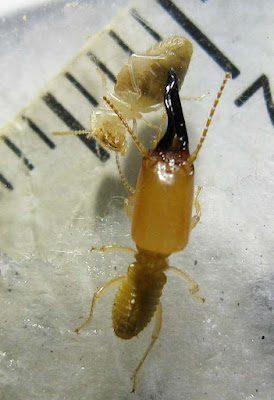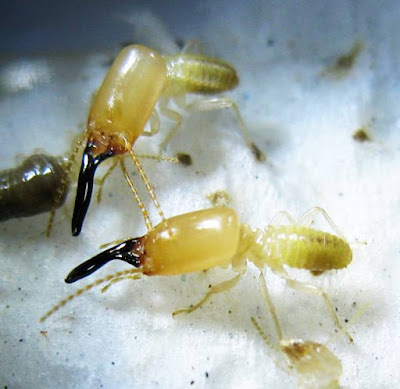A soldier and worker of a subterranean Nasutitermes.
Another species of Nasutitermes (or just a subspecies).
This might be a sub species as there is a slight difference in appearance. The head of the soldier is less rounded when viewed from top.
Center is a new secondary reproductive from a pseudergate. The secondary reproductive pair has already started egg laying.This is the male, the female looks similar but is larger in the abdomen.
Taxonomy
Kingdom: Animalia
Phylum: Arthropoda
Class: Insecta
Subclass: Pterygota
Infraclass: Neoptera
Superorder: Dictyoptera
Order: Isoptera 7499
Suborder: Fontanella
Subdivision: Longiprocta
Superfamily: Termitiodae
Family: Termitidae 46569
Subfamily: Nasutitermitinae
Genera:
Aciculioiditermes - Aciculitermes - Afrosubulitermes - Agnathotermes - Ahmaditermes - Ampoulitermes - Angularitermes - Anhangatermes - Antillitermes - Araujotermes - Arcotermes - Armitermes - Atlantitermes - Australitermes - Baucaliotermes - Bulbitermes - Caetetermes - Cahuallitermes - Caribitermes - Ceylonitermellus - Ceylonitermes - Coarctotermes - Coatitermes - Coendutermes - Constrictotermes - Convexitermes - Cornitermes - Cortaritermes - Cucurbitermes - Curvitermes - Cyranotermes - Cyrilliotermes - Diversitermes - Diwaitermes - Eleanoritermes - Embiratermes - Emersonitermes - Ereymatermes - Eutermellus - Fulleritermes - Grallatotermes - Havilanditermes - Hirtitermes - Hospitalitermes - Ibitermes - Kaudernitermes - Labiotermes - Lacessititermes - Leptomyxotermes - Leucopsitermes - Longipeditermes - Macrosubulitermes - Macuxitermes - Malagasitermes - Malaysiotermes - Mimeutermes - Mironasutitermes - Mycterotermes - Nasopilotermes - Nasutitermes - Nuiginitermes - Obtusitermes - Occasitermes - Occultitermes - Oriensubulitermes - Paracornitermes - Parvitermes - Periaciculitermes - Peribulbitermes - Postsubulitermes - Proaciculitermes - Procornitermes - Rhadinotermes - Rhynchotermes - Roonwalitermes - Rotunditermes - Sinonasutitermes - Spatulitermes - Subulitermes - Syntermes - Tarditermes - Tenuirostritermes - Thailanditermes - Triangularitermes - Trinervitermes - Tumulitermes - Velocitermes - Verrucositermes - Xiaitermes
Last Updated: 2011 08 28
© 2011 Quah. All rights reserved.







































